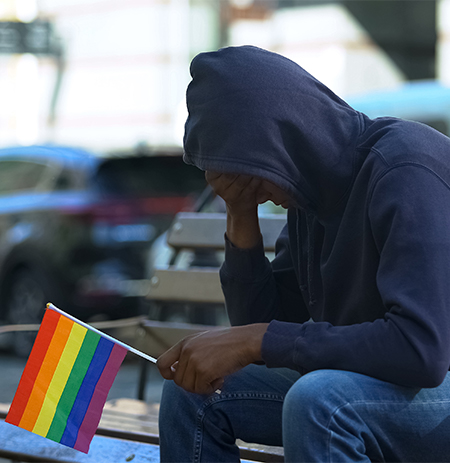 Being queer can create religious trauma.
Being queer can create religious trauma.
If you identify as part of the queer (LGBTQIA+) community, your faith is likely a tricky beast to manage. In most religions, queerness is not usually celebrated or even tolerated.
For some people, religion can feel like a protective layer against a world that can seem chaotic and scary. Our faith often sits at the core of who we are, guiding our belief systems. Our family dynamics often center around church or core religious beliefs.
Religious environments can be intense and full of emotion. When these harsh and emotional environments become coercive, overpowering, manipulating, and rigid, they become abusive and traumatic. The conflict between religion and queer (LGBTQIA+) identities may often feel very distressing for you, and our experiences growing up can have long-lasting impacts on our mental health and identities.
Suppose you experienced religious trauma related to your sexual orientation or gender identity. In that case, it might be challenging to integrate your spirituality or religious beliefs with your identity as a queer (LGBTQIA+) member.
What are the symptoms of religious trauma?
Obstructed emotional, social, and sexual development – As we progress through life, we pass through normative stages of individual development. Many queers discover they feel left behind or different from their peers after they have come out.
Depression, anxiety, and other mental health concerns – Sadness, mood instability, excessive preoccupation with perfection, and difficulty regulating one’s emotions may reach unhealthy levels.
Poor decision-making skills – You might feel like you need approval or help with decisions because your church or cult required you to abandon your desires for membership with them.
Lack of self-confidence or self-esteem – You might have gotten messages that you were intrinsically wrong and couldn’t trust yourself or your instincts.
Other symptoms may include pervasive feelings of shame or guilt, difficulty forming adult relationships, or career or job instability.
 Therapy helps with the recovery from religious trauma.
Therapy helps with the recovery from religious trauma.
Feeling normal after religious trauma can be difficult for queer believers. Religious trauma has become so deeply embedded into your nervous system that you constantly look for the next threat.
When you perceive threats, your nervous system automatically jumps in to protect you from danger, even when there is no danger.
The Queer Psychotherapy Collective has a religious trauma specialist that can help you work through your spiritual trauma in private, safe, and secure virtual therapy sessions.
Contact us today, and let’s help you overcome your religious trauma.

